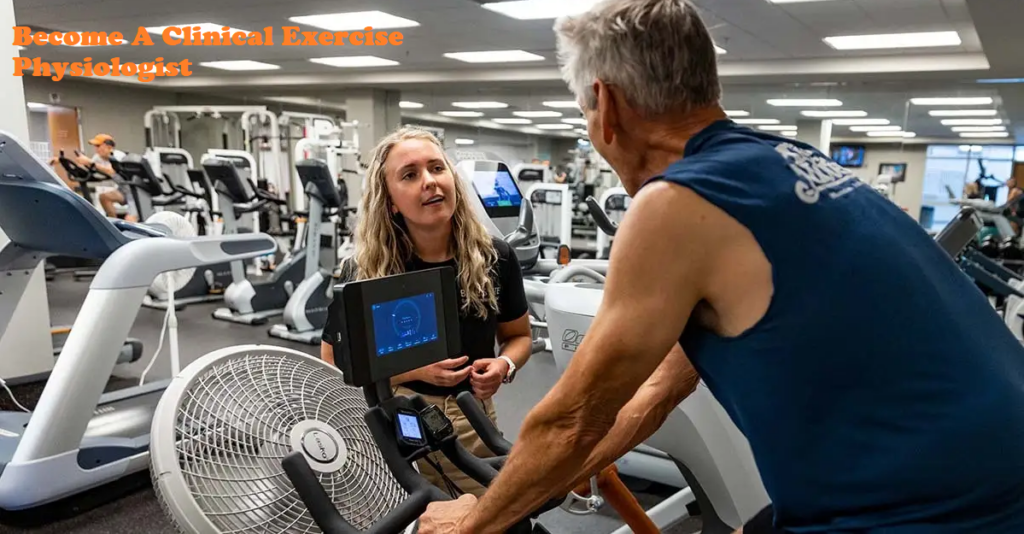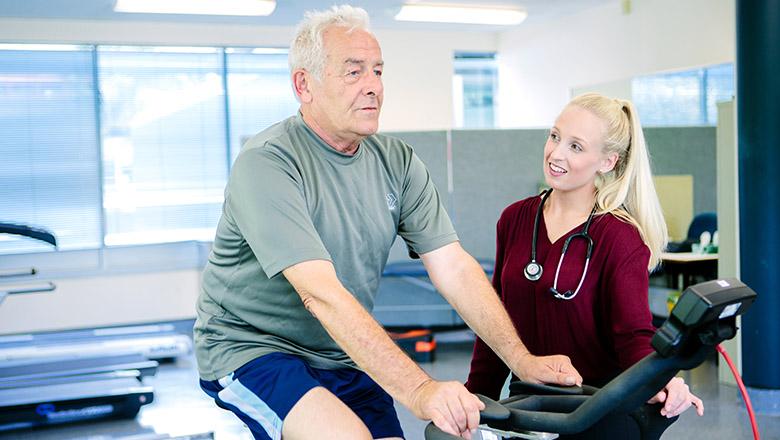040-444 Exam Dumps - ACSM Registered Clinical Exercise Physiologist
How To Become A Clinical Exercise Physiologist In 2024?
If you are interested in a career in the health and fitness industry, then becoming a Clinical Exercise Physiologist (CEP) may be a great option for you. Clinical Exercise Physiologists work with a variety of clients, including those with chronic illnesses and disabilities, to improve their overall health and fitness through exercise and lifestyle changes. In this guide, we’ll go over what a CEP does, the qualifications you need to become one, and the different paths you can take to achieve this career.
The Education Requirements for Becoming a Clinical Exercise Physiologist
Ever wanted to become a clinical exercise physiologist but didn't know where to start? Well, you've come to the right place! Here's a quick guide to get you on your way to becoming an elite clinician. First, you'll need a bachelor's degree in exercise science, physical education, kinesiology, or a closely related field.
This will get you the foundational knowledge you need to go further in your career. It's a good idea to pick a degree program that provides plenty of hands-on experience in a clinical setting. Once you have your bachelor's degree, you'll need to get certified as an exercise physiologist. Most states require professionals in this field to be certified by an accredited organization like the American College of Sports Medicine (ACSM).

Becoming certified usually involves completing a set of exams that prove your knowledge and understanding of exercise physiology. Next, you'll need to gain some practical experience. A few years of experience in a clinical setting can go a long way and help you stand out as a qualified exercise physiologist. You can gain this experience by working in a hospital, clinic, or rehabilitation facility.
Finally, you'll need to stay up to date with the latest developments in Clinical Exercise Physiologist. You can do this by taking continuing education classes and attending professional conferences. This will help you stay on top of the latest research and trends in the field. Now that you know what it takes to become a clinical exercise physiologist, the only thing left to do is get started! Good luck!
The Skills Necessary to Succeed as a Clinical Exercise Physiologist
Have you ever wanted to help others improve their physical health? Being a Clinical Exercise Physiologist is the perfect job for you! As a Clinical Exercise Physiologist, you will help individuals reach their personal health and fitness goals. To be successful in this field, you need to have certain skills. First, you must be an excellent communicator. You will need to have the ability to explain complex concepts to your clients in an easy-to-understand way.
You should also be patient and understanding when your clients have difficulty understanding or performing exercises. Second, you must be a problem solver. As a Clinical Exercise Physiologist, you will work with clients who have a variety of health conditions. You will need to be able to come up with creative solutions to help your clients reach their goals. Third, you must be organized.
You will need to keep track of your client's progress and modify their programs as needed. You will also need to stay organized when it comes to managing paperwork and scheduling appointments. Fourth, you must have a passion for helping others. You will be working with people who are trying to improve their health and fitness. This is a rewarding job, but it can also be challenging. You must have a genuine desire to help your clients reach their goals. Finally, you must have a strong knowledge of exercise physiology.
You will need to understand how the body works and how different types of exercises can affect it. This knowledge is essential for helping your clients achieve their health and fitness goals. If you have the skills necessary to succeed as a Clinical Exercise Physiologist, then you are on your way to a rewarding career. You will be helping others reach their physical health goals and improving their quality of life. So, don't wait any longer. Start your career today!
How to Network and Find Clinical Exercise Physiology Job Opportunities?
Are you looking to break into the clinical exercise physiology field? Are you having trouble finding job opportunities? Don't worry – networking and a bit of savvy can help you find the job of your dreams! First things first, start networking. You never know who may help you land your dream job.
Reach out to friends, family, and colleagues. Make sure to keep your connections informed of your job search. You never know who may be able to help you. Next, check out job boards. There are plenty of job boards out there that specialize in clinical exercise physiology jobs. Spend some time browsing the listings and see what catches your eye. You may even be able to apply directly for a job through a job board.
Don't forget to use social media. LinkedIn and Twitter are great places to start your search. Use your connections and follow groups related to the field. You never know what job opportunities may pop up. Finally, attend industry events. Conferences, seminars, and workshops are great places to meet people in the field. Make sure to bring your resume and business cards.

You never know who you may meet and what opportunities may arise! With a bit of networking and savvy, you can find the clinical exercise physiology job of your dreams! So start reaching out, browsing job boards, and attending events – you never know what opportunities may come your way. Good luck!
Tips for Developing an Effective Exercise Program for Patients
1. Start Slow.
Don't try to do too much too soon. If you're just getting started, start with just a few minutes of exercise a day. It's better to start small and work your way up than to overdo it and risk injury.
2. Set Realistic Goals.
Don't try to become a fitness guru overnight. Set achievable goals that you can reach.
3. Monitor Your Progress.
Make sure you are keeping track of the progress you are making. This will help you stay motivated and will give you an idea of what needs to be done next.
4. Mix It Up.
Don't just stick to one type of exercise. Try different activities, like walking, biking, swimming, and strength training. This will help keep your workouts fresh and enjoyable.
5. Be Mindful Of Your Limitations.
If you have any health issues or physical limitations, make sure you talk to your doctor before starting any new exercise program.
6. Have Fun.
Exercise doesn't have to be a chore. Try to make it fun by listening to music or watching TV while you exercise.
7. Get Some Help.
If you're feeling overwhelmed, don't be afraid to ask for help. A personal trainer or physical therapist can help you develop an effective exercise program that works for you.
How to Use Your Clinical Exercise Physiologist Knowledge to Promote Healthy Lifestyles in Your Community?
If you’re a Clinical Exercise Physiologist, you have a unique set of skills that you can use to promote healthy lifestyles in your community. You know the importance of physical activity and how it can benefit both physical and mental health, so why not use that knowledge to help others? Here are a few ideas to get you started:
1. Host An Exercise Class.
Put together an exercise class that’s tailored to the needs of your community. If you’re in a rural area, you could organize a boot camp or a walking group. If you’re in an urban area, you could host a Zumba class or a yoga session. Whatever you choose, make sure you emphasize the importance of physical activity and the many benefits it can provide.
2. Start A Blog.
Use your expertise to create a blog that provides helpful information about physical fitness and nutrition. You can also use the blog to answer questions from readers and provide advice on how to get started with an exercise program.
3. Organize A Health Fair.
Put together a health fair in your community to raise awareness about the importance of physical activity and healthy eating. You can invite local experts to give talks and demonstrations and provide information about healthy lifestyle choices.
4. Get Involved In Local Sports.
Join or volunteer with a local sports team or organization. Whether it’s basketball, baseball, soccer, or something else, you can help promote the importance of physical activity in your community.
5. Offer Personal Training Services.
Use your expertise to offer personalized training services to members of your community. You can provide one-on-one sessions with clients to help them reach their fitness goals. These are just a few ideas to help you use your knowledge of Clinical Exercise Physiology to promote healthy lifestyles in your community. Whether you’re hosting an exercise class or offering personal training services, you can make a real difference in the lives of those around you.
Conclusion
Becoming a clinical exercise physiologist is a great career choice for those who are interested in helping others improve their physical health and performance. It requires a combination of knowledge, skills, and dedication to become successful in the field. Clinical exercise physiologists must possess an in-depth understanding of exercise physiology, anatomy, and kinesiology, and be able to combine these with their clinical training and experience. In addition, they must be committed to helping their patients reach their goals, no matter how challenging the process may be. With the right education, experience, and motivation, anyone can become a successful clinical exercise physiologist.
Comments (0)